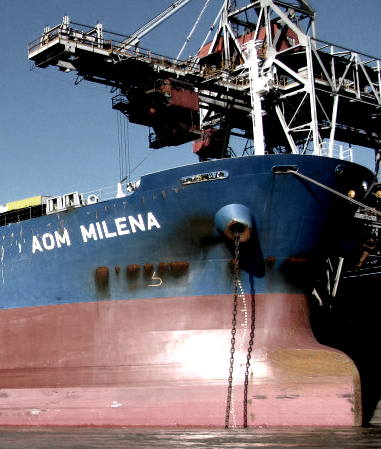Flag rules leave more crews in dire straits
 The crew of a Rio Tinto-chartered ship has caught the eye of the International Transport Federation (ITF), following reports it has underplayed its crew and left them in poor conditions.
The crew of a Rio Tinto-chartered ship has caught the eye of the International Transport Federation (ITF), following reports it has underplayed its crew and left them in poor conditions.
The ITF says that the claims came while the ship - AOM Milena - was operating in Australian waters, highlighting systemic problems with the ‘flag of convenience’ system.
ITF national coordinator Dean Summers said 21-person crew had received no wages since April, was running short on food, and was forced to live and work in filth.
“Not content to employ seafarers from poverty-riddled nations on wages that amount to just $2 per hour, the operator of this ship has not paid a single cent in wages to these crew members since April,” Summers said.
He joined a group of inspectors boarding the ship yesterday at Gladstone this week, and allegedly confirmed that the crew had not been paid.
“The food situation is equally dire, with the crew given just $50 per day to buy food for 21 people ahead of the next leg of their planned voyage, where they will sail to Weipa to collect a load of Bauxite for Rio Tinto,” he said.
“The ship was just filthy, it was a grubby, grotty ship with a crew being treated badly, so I don’t suppose you can inspire seafarers much if you don’t feed them and pay them badly.”
The bulk carrier is being chartered by Rio Tinto as a coastal trader, carrying bauxite from Weipa and Gove to the Alcan Yarwun Refinery north of Gladstone, remaining in Australian waters the whole time.
Ship operator Keymax Maritime has reportedly claimed to the ITF that a mistake had been a made with the payment of the crew.
But the ITF says this case only adds to the list of other ships identified as being run by Keymax that also have wage payment problems.
“There was a hollow excuse made, but the facts are that we have a list of Keymax vessels, where this continues to happen,” Summers said.
“Keymax have a big fleet, and I’ve gone through with the Japanese ITF and we’ve identified a large number of their fleet with a systemic problem of non-payment of wages.”
The AOM Milena is Japanese-owned, registered in Panama, operates out of Portugal, and crewed solely by Filipino workers, but because it operates under the ‘flag of convenience’ system, it is allowed to avoid stricter local laws and regulations.
A set of changes to coastal shipping introduced to Federal Parliament by Transport minister Warren Truss last month are aimed at deregulating the industry even further, allowing the last remaining Australian-crewed vessels to be replaced by flag of convenience ships.
“On the same day this crew sailed into Gladstone, the second last Australian-crewed oil tanker was told to depart Devonport and head to Singapore, where the crew was to be replaced by exploited foreign workers on as little as $2 an hour,” Summers said.
“On the eve of Warren Truss’s announcement that the government was going to take away any form of support for Australian shipping, and we’ve seen Caltex jump the gun and take their crews off, we’ve seen shipping take a steep decline because the coast has been opened up to the cheapest possible shipping, and this is a very dangerous situation for Australia.”
The ITF says the proposed legislative change would be a threat to Australia’s energy security, as international operators would become solely responsible for the transport of Australian fuel.
There may be some sense injected into the push for deregulation however, with a senate inquiry into the ‘flag of convenience’ (FOC) shipping system launched in response to suspicious deaths aboard the FOC vessel Sage Sagittarius in 2013.







 Print
Print